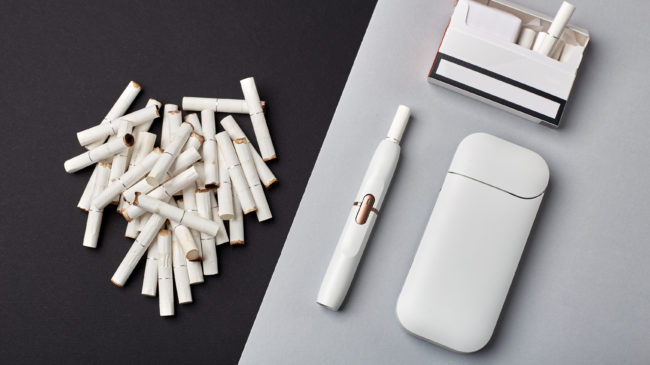Three years after Philip Morris International (PMI) submitted a modified risk tobacco product application (MRTP) to the Food and Drug Administration (FDA) for its IQOS tobacco heating system, the agency has finally made a decision. On Tuesday, the FDA announced Philip Morris can now claim that switching from smoking to IQOS significantly reduces exposure to the harmful chemicals found in cigarette smoke.
Philip Morris International Inc. can market its IQOS products as reducing consumers’ exposure to harmful chemicals found in cigarettes, the U.S. Food and Drug Administration said Tuesday.
IQOS heats tobacco rather than burning it, a process seen as less harmful than smoking conventional cigarettes. The FDA last year allowed IQOS, which is an electronic device that uses a tobacco plug, to be sold in the U.S. while it reviewed Philip Morris’s modified-risk product application.
The FDA on Tuesday said that available evidence shows IQOS’s production of harmful and potentially harmful chemicals is lower that that of regular cigarettes. The agency cited scientific studies showing that switching completely to the IQOS system from cigarettes significantly reduces exposure to such chemicals.
For any tobacco product to claim reduced harm or exposure to toxic chemicals, the companies selling them must submit an MRTP at considerable cost in time and money. The MRTP process is a consequence of the 2009 Tobacco Control Act, which was strongly supported by Philip Morris.
There are two types of MRTP orders. One refers to risk modification and the other to exposure modification. PMI applied for both, but the FDA decided only to grant the exposure modification.
Philip Morris is now allowed to make the following claims with regards to IQOS:
- The IQOS system heats tobacco but does not burn it.
- This significantly reduces the production of harmful and potentially harmful chemicals.
- Scientific studies have shown that switching completely from conventional cigarettes to the IQOS system significantly reduces your body’s exposure to harmful or potentially harmful chemicals.
FDA is satisfied that IQOS is appropriate to promote public health and expects it to benefit the health of the population as a whole.
“Data submitted by the company shows that marketing these particular products with the authorized information could help addicted adult smokers transition away from combusted cigarettes and reduce their exposure to harmful chemicals, but only if they completely switch,” said Mitch Zeller, J.D., director of the FDA’s Center for Tobacco Products.
The FDA will closely monitor how IQOS performs to ensure youth don’t begin using the product. Fortunately, IQOS is highly unlikely to appeal to teens. In Japan, where the product has been most successful and faces no competition from e-cigarettes, youth use is minimal.
The FDA’s decision is good news for public health. Smokers looking for a safer alternative to traditional cigarettes will both have access to IQOS and necessary information to make an informed choice. More than 10 million smokers worldwide have already made the switch to IQOS, according to Philip Morris.
Heated tobacco products like IQOS are relatively new. Unlike e-cigarettes, they use real tobacco, but because the device heats plugs of tobacco known as heat sticks, rather than burning them, both the user’s exposure to harmful and potentially harmful chemicals is dramatically reduced.
According to a study by the American Cancer Society in 2019, the dramatic decline in Japanese cigarette sales of 10 percent per year from 2015 through 2018 is attributable to heated tobacco products like IQOS.
For policymakers, there’s a clear and obvious conclusion to be drawn from the FDA’s decision: IQOS differs dramatically from traditional cigarettes and should not be treated equivalently.
To maximize the potential of IQOS to improve public health, legislators should tax it at a significantly lower rate than cigarettes. Letting people know that IQOS reduces exposure to harmful chemicals, when compared to cigarettes, will be crucial to getting public health successes from IQOS and products like it. Government actions that raise the price or limit consumer awareness of these products will only serve to keep smokers using and smoking traditional products.
IQOS is only the second product ever to be accepted as a modified risk tobacco product. While FDA’s decision is undoubtedly the right one, it highlights that the current process poses significant barriers to entry to smaller companies trying to obtain MRTPs. Philip Morris was only able to gain an MRTP after three years and millions of dollars spent.
There’s a similar problem occurring with e-cigarette products. Few e-cigarette companies have the deep pockets of Big Tobacco giants like Philip Morris needed to navigate this process. And many vaping companies may struggle to remain on the market this year, let alone inform smokers of the benefits of switching to vaping.
The FDA is requiring these e-cigarette manufacturers to submit premarket tobacco applications (PMTA) to the FDA in September. Without substantial easing of this process combined with clearer guidance from the FDA, most e-cigarette companies will fold. As the FDA put it, “Under the PMTA pathway, which is the marketing pathway most likely to be pursued for electronic nicotine delivery systems (ENDS) products, manufacturers or importers must demonstrate to the agency, among other things, that marketing of the new tobacco product would be appropriate for the protection of the public health.”
Vaping and IQOS are less harmful to users than smoking cigarettes. If the FDA and Congress wish to see smoking rates decline even more rapidly than they have in recent years, it needs to reform and streamline its regulatory process so that potentially innovative products that can help public health are able to enter a free and competitive marketplace.

